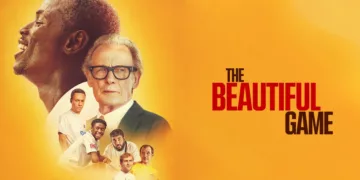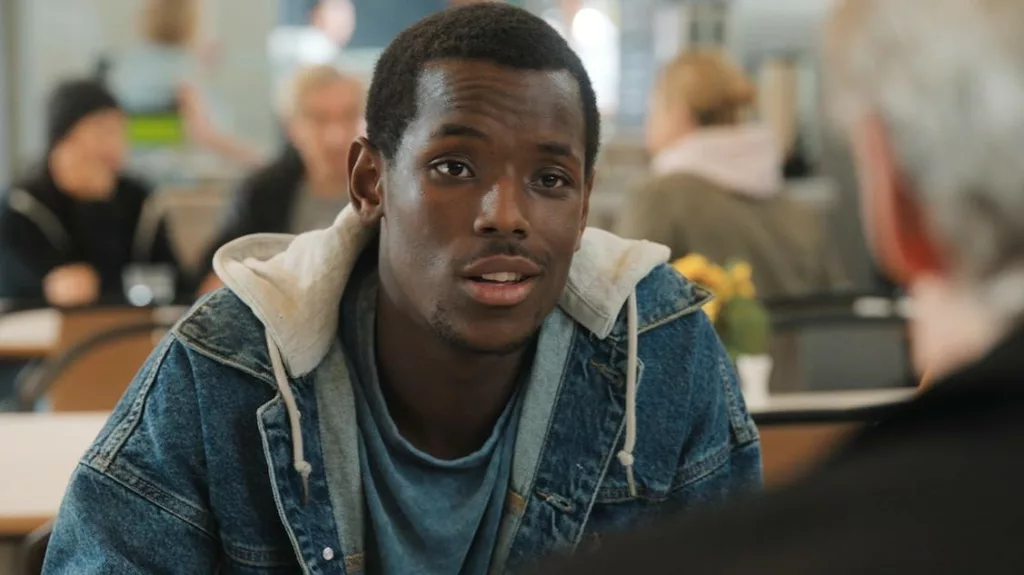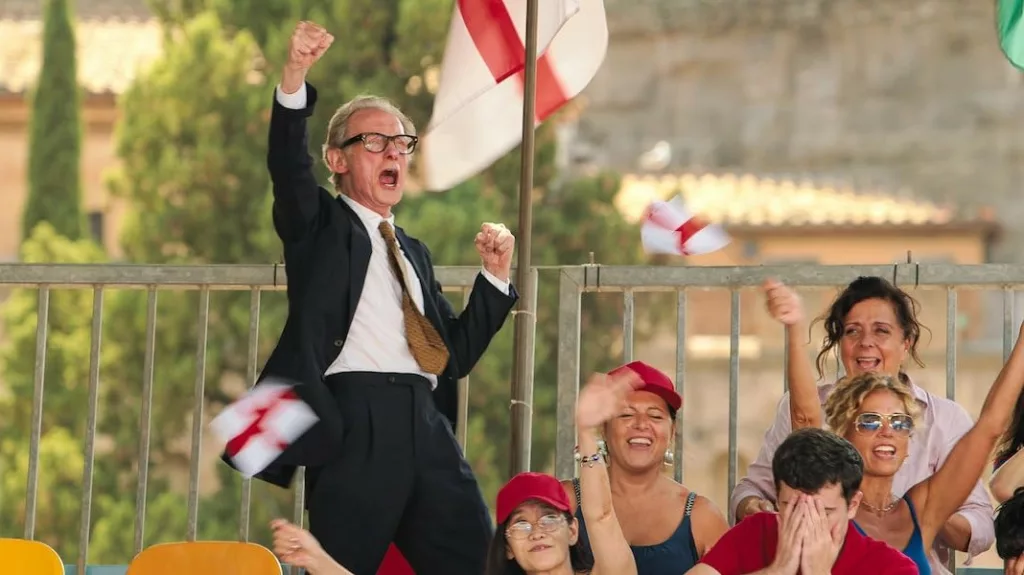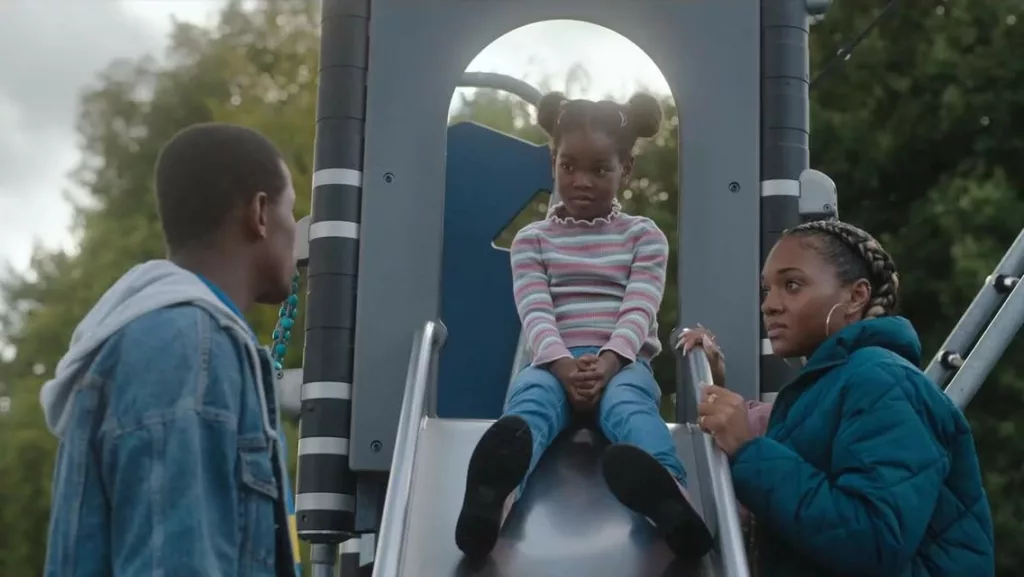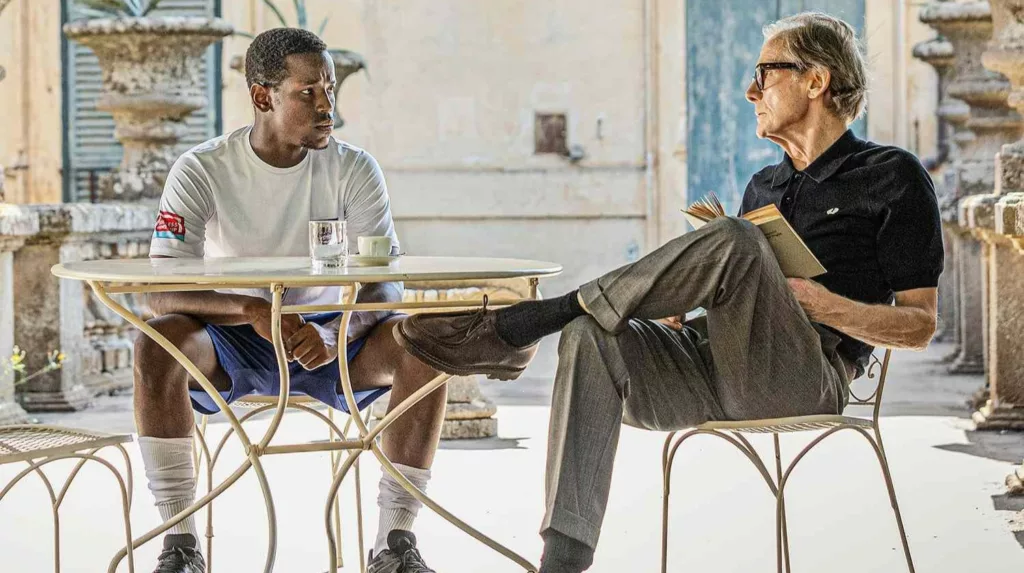From the moment we meet him, Vinny seems alone. Living out of his car with few connections, his pride keeps him at a distance, even from his young daughter. But there is a spark of joy still alive in him—we see it when he hijacks that kids’ football match just for the chance to feel the ball at his feet again. His skill draws the eye of Mal, who is holding tryouts for an unlikely team—England’s squad for the Homeless World Cup. Though hesitant at first, Vinny finds himself drawn to the promise of a trip abroad and a role where he can showcase his passion.
So with Mal as coach, Vinny joins Nathan, Aldar, and the others on a journey to Rome that will be about far more than what happens on the field. Written by Frank Cottrell-Boyce and directed by Thea Sharrock, The Beautiful Game takes us inside this real-life tournament where people facing life’s hardest challenges come together through the shared language of football.
With Bill Nighy and Michael Ward leading the cast, the film celebrates how finding purpose as part of a team can open one’s eyes to the community holding out a hand in the moments one feels most alone. On the pitch and off, this band of strangers just may discover what it means to call a place home.
The Beautiful Coaches
Bill Nighy portrays Mal, a former football scout who now dedicates himself to helping the less fortunate. Though skilled in his field, Mal feels lost after the death of his wife leaves an empty space in his life. He fills that space by coaching a team for the Homeless World Cup, providing not just training but compassion to the men under his care.
Mal sees promise in Vinny from their first meeting. Living out of his car with estranged family ties, Vinny fronts a tough exterior to mask his own troubles. A gifted striker, his skills shine, but so too does his pride, which rejects assistance. Slowly, under Mal’s guidance, Vinny allows glimpses of the caring father and teammate within as bonds form with this makeshift football family.
From Syria to South Africa, the film introduces a diverse ensemble. Aldar fled the war in his homeland. Kevin risks falling back to addictions without the structure of training. Cocky Cal feels replaced by Vinny’s talent. Each man grapples with obstacles that coaching proves greater than any game could be.
The team travels to Rome, the site of the tournament, optimistic but hesitant. Vinny, in particular, resists the aid of people he insists are not his equals. During early matches against groups like the underdog Japanese, resilience strengthens where individuals might have faltered.
Characters from Sister Protasia’s spirited South Africans to Rosita dodging prejudice at every turn enhance drama with dashes of humor. As friendships emerge and nerves settle, these coaches without badges may discover in one another what has been missing in their lives outside of football.
Taking a Chance on Each Other
These footballers have struggled in their own lives, each dealing with challenges that left them without a home. But together, as a team, they find something greater than themselves—a sense of belonging.
Mal brings these men to Rome, hoping the tournament can offer them more than just a game. For Vinny, still living in his car and reluctantly joining the squad, it’s hardest to open up. His talent on the pitch can’t mask the walls around his heart. But by supporting each other through victory and loss, the guys form bonds that help carry them through tough times.
When problems arise for Nathan as old demons resurface, his new friends rally by his side. Their care gives him strength when he needs it most. In those brief yet powerful moments of community, we see how their struggles can lift each other up rather than drag one another down. Differences that may divide in the outside world become streams bridged through friendship.
Even as tensions flare on the field, their shared experience of life on the margins fosters empathy between teams. The South Africans especially touch our hearts with their resilience through hardship. But more than the competition is what draws these players—a chance to belong and to feel worthy again through the simple joy found in a beautiful game.
By the tournament’s end, we glimpse what healing looks like—the walls not fully mended but cracks filled in by care and compassion. How a collection of lost souls found purpose in taking a chance, with nothing to lose but each other to gain. reassurance that even when alone, we need never walk that road.
The Human Touch
Director Thea Sharrock steers The Beautiful Game with a deft yet tender hand. What could have felt trite or formulaic in lesser hands becomes a thoughtful exploration of the human spirit. Sharrock finds moments both poignant and profound in even the most mundane of scenes, imbuing each character with dignity.
She is aided enormously by the central performances that lift the film to new heights. Bill Nighy brings warmth and wisdom to his role as Mal, a man learning there are many ways to care for others. His subtle, understated work breathes life into a character who could have become a mere trope.
Standing tall against such an accomplished actor is Michael Ward, whose charismatic and complex turn as Vinnie proves him one of his generation’s most compelling talents. Ward ensures we see this prickly man’s vulnerability, tracing his journey from pride to acceptance with skill and soul.
Supporting them is a hugely impressive ensemble. Callum Scott Howell and Robin Nazari especially leave a mark as Nathan and Aldar, respectively, crafting fully realized individuals from what could have been superficial archetypes. Each member brings specificity and depth to lives that might otherwise have been reduced to plot devices. Even glimpses of other teams, like Susan Wokoma’s spirited nun, become indelible through truthfully rendered details.
It is a testament to Sharrock and her cast that The Beautiful Game finds profound shared humanity in characters society often renders invisible. Through their skilled, heartfelt work, complicated lives come vibrantly to life onscreen, celebrating dignity in all its forms.
The Beautiful Places
Mike Eley’s camerawork truly lets Rome shine in The Beautiful Game. His wide shots sweep across sun-drenched streets and sweeping plazas, putting you right there among the timeworn architecture that seems to glow in the warm Italian daylight. His close-ups are equally artful, finding novel visual compositions within even the smallest moments. Eley fills the frame with little details, from the intently focused players to crowds relaxing in parks, taking it all in.
The soundtrack is a lovely complement. Paul Simon’s songs seem perfectly chosen, their bittersweet nostalgia capturing something of the film’s bittersweet mood. Hearing classics like “Bridge Over Troubled Water” and “Homeless” wash over pivotal scenes lifts them even higher, tugging subtly at the heartstrings.
Overall, the production excels at using Rome as more than just a backdrop. Its iconic landmarks and bustling squares feel like living, breathing characters in their own right. Similarly, the costume, set, and location choices help make the characters’ lives vividly real despite their hard times.
From run-down parks to cheerfully mismatched team kits, it’s the little authentic details that make this fictional world feel truthfully lived-in. The result is a film that celebrates both the human spirit and the eternal allure of its beautiful setting.
Finding Home: How The Beautiful Game Spreads its Message of Hope
The Beautiful Game tells the story of a group of homeless men who come together through their love of football. But the film has bigger aspirations than simply entertaining viewers. It seeks to shine a spotlight on the very real people and problems that inspired its story.
At the heart of the movie is the Homeless World Cup, an annual tournament that gives houseless players from around the globe a chance to find purpose and community through sport. By showcasing different teams—from England to South Africa to Japan—director Thea Sharrock ensures no one feels alone in their struggles. Whether dealing with addiction, loss of family, or the trauma of forced migration, each character’s battle resonates with others.
The tournament itself offers respite from life’s hardships, a brief period where skills on the pitch take priority over a lack of housing off it. But the film suggests its greater impact lies in demonstrating that homeless individuals should not be defined by their circumstances or marginalized by society. They deserve the same dignity and respect as anyone else.
By crafting a feel-good film around such a thoughtful concept, The Beautiful Game introduces audiences worldwide to both the Homeless World Cup and the realities faced by its players. Its hopeful message—that we all strive for belonging and redemption and can lift each other up through compassion—is no doubt meant to last far beyond the final whistle. The movie proves that stories sharing such universal truths can inspire and foster understanding in a world that still has progress to make.
Rooting for the Underdog
This film warms the heart with its celebration of community and second chances. At its core, The Beautiful Game honors the human spirit that unites us—our shared hopes, our capacity for empathy, and our need to support one another through life’s ups and downs.
Mal and the players remind us that we all struggle at times, and there is nobility in lifting each other up. Their story, inspired by real lives, brings light to those facing adversity with resilience, humor, and heart. Though confrontations emerge on the field, their bonds prove stronger. And in sharing their gifts, each discovers a new purpose.
Families and sports fans alike will find enjoyment in the friendships forged and skills displayed. But the message resonates far beyond the pitch—it calls us to see our shared humanity. With charm and compassion, Sharrock guides us to this truth, leaving viewers smiling and thinking. Her characters exemplify what we gain from embracing communities as equals.
When the final whistle blows, this feel-good story lingers through its empathetic spirit. It deserves an audience to be lifted by its quiet message: that through our common hopes, we can all play on the same team.
The Review
The Beautiful Game
The Beautiful Game is a heartwarming story that celebrates hope, community, and our shared humanity. Though following a predictable sports film formula, Sharrock's direction and the authentic ensemble performances imbue the film with sincerity and social purpose that outweigh its few flaws. Uplifting and crowd-pleasing entertainment deserves recognition for the meaningful issues it promotes through an accessible and thoughtful vehicle.
PROS
- Heartwarming message of community, support, and second chances
- Authentic ensemble performances, especially from Nighy and Ward
- Highlights of the inspirational real-life Homeless World Cup event
- Feel-good and crowd-pleasing entertainment for all ages
CONS
- Predictable sports drama formula and storyline
- Some unnecessary subplots could be trimmed for brevity.
- Occasional flaws in pacing and match-scene choreography
